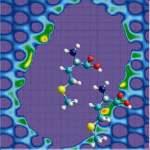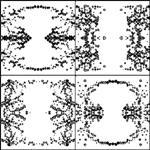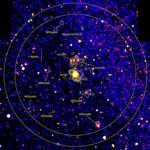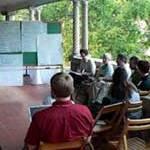Research

Experimental Condensed Matter
Laboratory investigations of condensed matter, including nanostructures, thin films, and hybrid organic/inorganic structures, in addition to traditional solid state materials. Electronic, magnetic, optical, and morphological properties are studied using X-ray reflectivity, Brillouin light scattering, magneto-optical Kerr effect, Mössbauer spectroscopy, scanning tunneling microscopy, electron diffraction, and others. Fundamental properties at the surface and in the bulk, as well as applications of advanced materials, are investigated.
Faculty: From, Leger, Riemann, Seda
Recent student contributions have included investigations into organic polymer-based solid state memory, structure of L-methionine at the liquid-solid interface, and biomedical applications of magnetic nanoparticles.

Condensed Matter Theory
Computational and analytical models of thin films and nanostructures, including electron transport, optical excitation, plasmons and plasmon-polaritons in nano-scaled layered systems.
Recent student contributions have included models of magneto-plasmon polaritons in thin films, growth of thin organic semiconductor films, theory of molecular- and nanostructured electronics, and radiation transport through soft tissue for biomedical application.

Astronomy
Observational research using ground-based and space-based data as well as archival data in the optical and near-infrared. Topics of investigation include cosmological parameters, galaxy clusters, star formation, and dust in the translucent interstellar medium.
Faculty: Covey, Larson, Rines, Rice
Recent student contributions have included measurements of interstellar reddening in all-sky surveys, mass-to-light profiles in nearby galaxy clusters, and star formation at high galactic latitude.

Physics Education
Systematic research on the learning and teaching of physics. Aspects of student thinking that are examined include conceptual understanding, reasoning ability, and metacognition. Methods of investigation include the use of written assessments to probe student ideas as well as video studies of student interactions in classroom settings. An emphasis is the development and assessment of instructional strategies that can improve student learning.
Recent student contributions have included the identification of difficulties with multi-step reasoning in fluid dynamics and electrostatics, examination of ratio reasoning in kinematics, and the use of concept inventories to examine gender differences in student learning.
